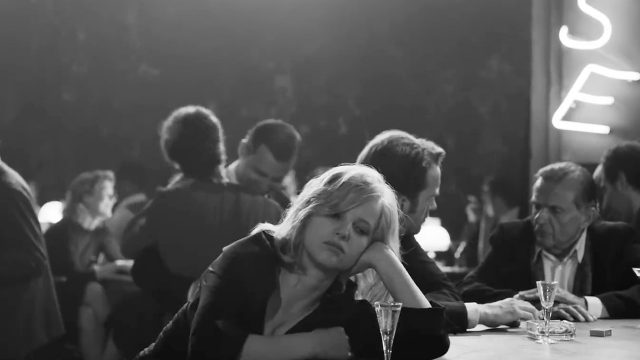AFI Fest 2018: Cold War, by David Bax
With its crisp black and white photography and its preoccupation with folk music, Pawel Pawlikowski’s Cold War bears an initial resemblance last year’s Song of Granite. In that beautiful film, though, director Pat Collins told the story of his folk singer subject’s internal life, focusing on the parts of him that remained unchanged by age or incident or even thousands of miles of geography. Cold War takes the opposite approach; while existing in several modes at once, it features characters who seem almost constantly to be shoved around or thrown off track by external forces. Yet something of them remains constant too.
Tomasz and Joanna Kulig star as Wiktor and Zula, a Polish pianist and singer who meet in the late 1940s at a camp whose aim is to appropriate the country’s traditional songs for the glorification of the socialist state. Across more than fifteen years and at least three countries, we watch as the two are repeatedly separated and reunited by circumstance, their devotion only strengthened by the constant strains.
So, Cold War is a story about love. Even before Wiktor and Zula begin their affair, it’s there in the passion behind the music, which is actually more palpable than that between the leads. Despite the strength of both performances, there’s an unfortunate lack of chemistry. Still, these star-crossed lovers are resolute in their commitment to one another, proclaiming “Till death do us part” and “Till the end of the world” (Garth Ennis might want to call his lawyer about that last one). Their convictions toward one another outshine those they have for Poland, despite what the nation demands of their loyalty.
And so, Cold War is a story about politics. Wiktor’s love for Zula doesn’t stop him from escaping to the West on his own when he gets the chance. And Poland didn’t organize the folk music camp just because they love these songs. Really, Wiktor doesn’t love them either; he’d rather be playing the jazz music coming over from the morally bankrupt United States.
Which means that, to some extent, Cold War is a story about art. It’s what brings Wiktor and Zula together multiple times and, at least once, it’s what keeps them apart. Perhaps it’s actually by design that Wiktor has more chemistry with his piano than he does with Zula.
Maybe, ultimately, Cold War is a story about faith. All of these things—love, politics, art—require some level of unyielding belief in order to have the effects that they do. The structure Pawlikowski adopts, suddenly leaping forward anywhere from two to five years at a time, illustrates how much some things change while, by returning again and again to head-on shots of Zula in traditional costume singing songs older than she is comically underlines our inability to accept these ongoing shifts. We forestall change by believing in absolute truths. Mostly, this is folly but, for Wiktor and Zula, their devotion to each other is the one thing in their world not built on sand. I was right the first time. Cold War is a love story.



























